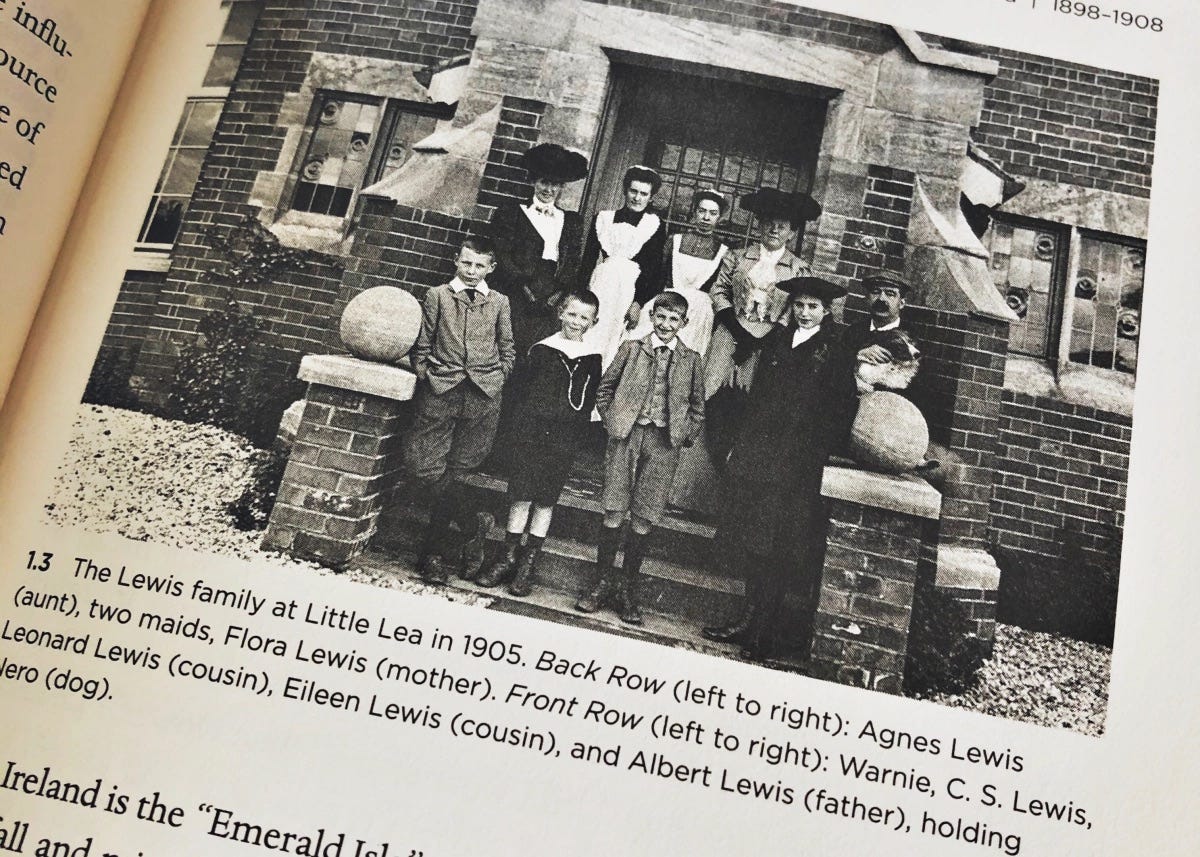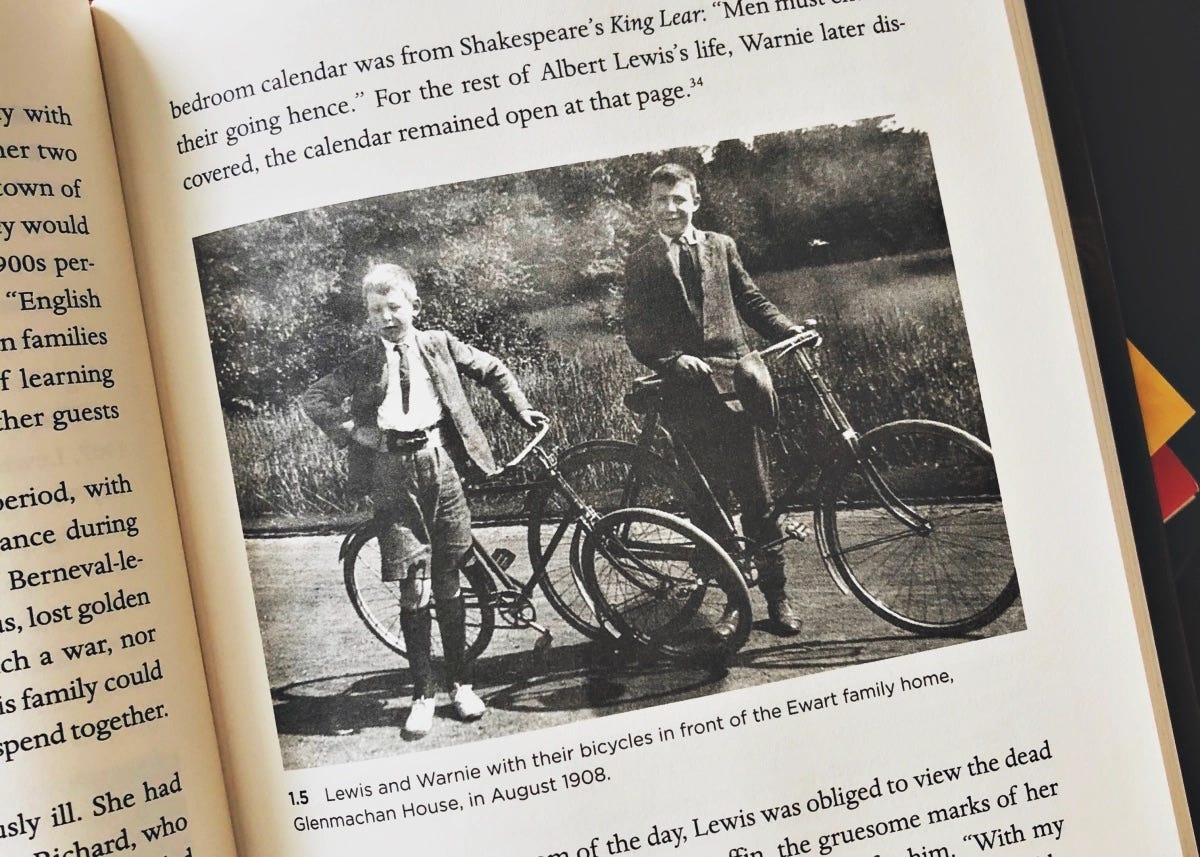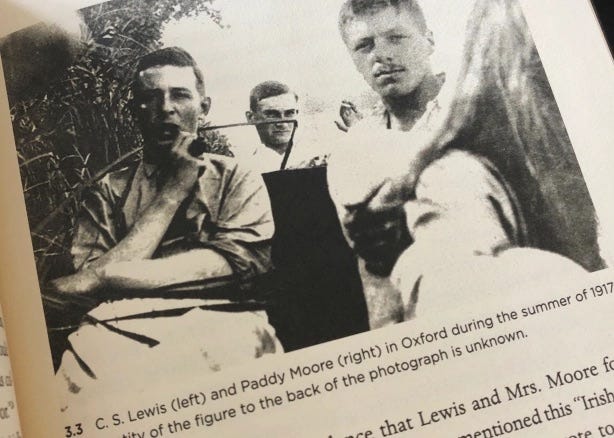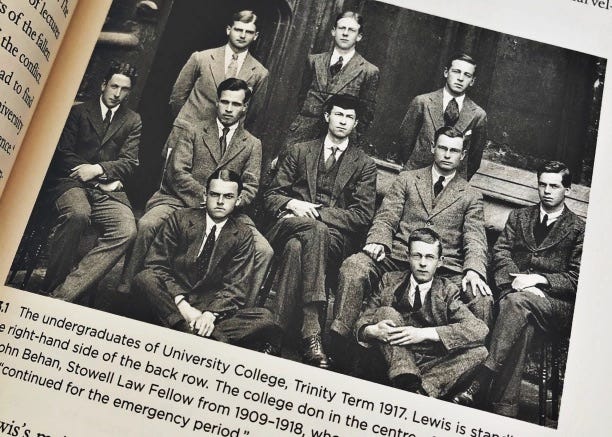C.S. Lewis starts his memoir, Surprised by Joy, in the most C.S. Lewis way possible:
“The story is, I fear, suffocatingly subjective; the kind of tiling I have never written before and shall probably never write again. I have tried so to write the first chapter that those who can’t bear such a story will see at once what they are in for and close the book with the least waste of time.” If he only knew how many millions would continue to read his words decades after he penned them.
Clive Staples was born on November 29, 1898 just outside of Belfast.
Photo from C.S. Lewis: A Life by Alister McGrath
Lewis was a romantic from a young age. He was known as Jack by everyone and, as some sources suggest, he got that nickname at only four years old. The story goes that the Lewis’ had a dog named Jacksie, who was sadly hit by a car. From that time on, young Lewis demanded to be called Jacksie and as he got older, that shifted to Jack.
He was also very close to his older brother, Warnie, who he called a blessing from early on. While they had different tastes, he wrote “Though three years my senior, he never seemed to be an elder brother; we were allies, not to say confederates, from the first. Yet we were very different. Our earliest pictures (and I can remember no time when we were not incessantly drawing) reveal it. His were of ships and trains and battles; mine, when not imitated from his, were of what we both called “dressed animals”—the anthropomorphized beasts of nursery literature.”
Narnia was already calling him.
One of my favorite stories Lewis shares from his childhood is what led him to writing. It wasn’t a desire born from birth, but a path he reluctantly went down. Again from Surprised by Joy:
“What drove me to write was the extreme manual clumsiness from which I have always suffered. I attribute it to a physical defect which my brother and I both inherit from our father; we have only one joint in the thumb. The upper joint (that furthest from the nail) is visible, but it is a mere sham; we cannot bend it. But whatever the cause, nature laid on me from birth an utter incapacity to make anything. With pencil and pen I was handy enough, and I can still tie as good a bow as ever lay on a man’s collar; but with a tool or a bat or a gun, a sleeve link or a corkscrew, I have always been unteachable. It was this that forced me to write. I longed to make things, ships, houses, engines. Many sheets of cardboard and pairs of scissors I spoiled, only to turn from my hopeless failures in tears. As a last resource, as a pis aller, I was driven to write stories instead; little dreaming to what a world of happiness I was being admitted. You can do more with a castle in a story than with the best cardboard castle that ever stood on a nursery table.”
Photo from C.S. Lewis: A Life by Alister McGrath
In 1908, tragedy would strike the Lewis household and forever leave a mark on Lewis’s life. His mother, after battling cancer, passed away. In Surprised by Joy, Lewis spoke openly about this time in his life and the effect it had on him and his family:
There came a night when I was ill and crying both with headache and toothache and distressed because my mother did not come to me. That was because she was ill too; and what was odd was that there were several doctors in her room, and voices and comings and goings all over the house and doors shutting and opening. It seemed to last for hours. And then my father, in tears, came into my room and began to try to convey to my terrified mind things it had never conceived before. It was in fact cancer and followed the usual course; an operation (they operated in the patient’s house in those days), an apparent convalescence, a return of the disease, increasing pain, and death. My father never fully recovered from this loss.
Grief in childhood is complicated with many other mis cries. I was taken into the bedroom where my mother lay dead; as they said, “to see her,” in reality, as I at once knew, “to see it.” There was nothing that a grown-up would call disfigurement—except for that total disfigurement which is death itself. Grief was overwhelmed in terror. To this day I do not know what they mean when they call dead bodies beautiful. The ugliest man alive is an angel of beauty compared with the loveliest of the dead.
After his mother’s death, he was sent to England and eventually went to Wynyard Prep School. If you ever do get a chance to read his autobiography, you will quickly see how awful it was. Thankfully, he was able to move to private tutoring before sitting for his Oxford University exams in 1916. Even his first experience with Oxford makes for a great story:
“My first taste of Oxford was comical enough. I had made no arrangements about quarters and, having no more luggage than I could carry in my hand, I sallied out of the railway station on foot to find either a lodging house or a cheap hotel; all agog for “dreaming spires” and “last enchantments.” My first disappointment at what I saw could be dealt with. Towns always show their worst face to the railway. But as I walked on and on I became more bewildered. Could this succession of mean shops really be Oxford? But I still went on, always expecting the next turn to reveal the beauties, and reflecting that it was a much larger town than I had been led to suppose. Only when it became obvious that there was very little town left ahead of me, that I was, in fact, getting to open country, did I turn round and look. There, behind me, far away, never more beautiful since, was the fabled cluster of spires and towers. I had come out of the station on the wrong side and been all this time walking into what was even then the mean and sprawling suburb of Botley. I did not see to what extent this little adventure was an allegory of my whole life.”
While he started his Oxford education, Lewis didn’t make it a full term before he enlisted.
I hope you enjoyed a very brief overview of Lewis’ early years! I’ll end with this random hilarious quote from Surprised by Joy that I fully relate to: “I could never have gone far in any science because on the path of every science the lion Mathematics lies in wait for you.”
(Adapted from the original post for Inklings Week 2020. © 2023 Jamie Lapeyrolerie)








Surprised by Joy is my all-time favorite CS Lewis book.